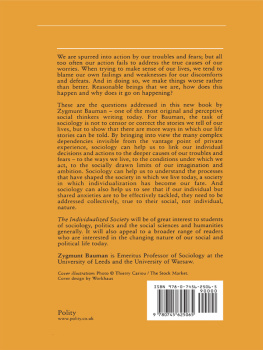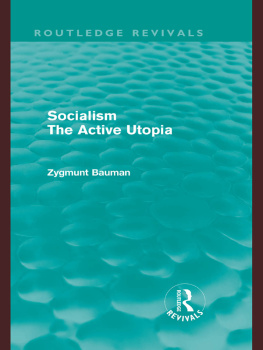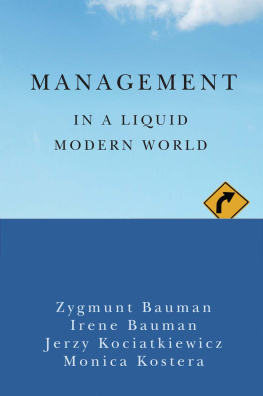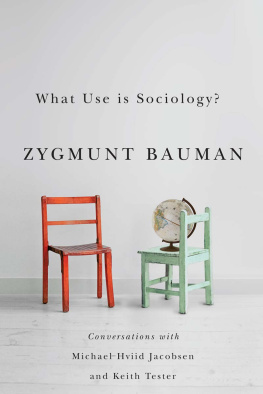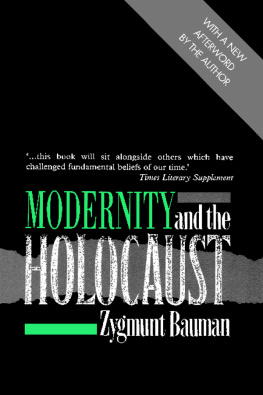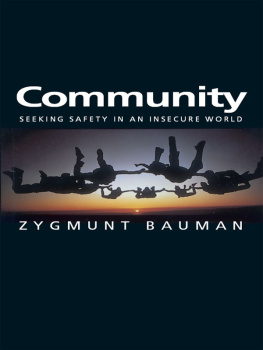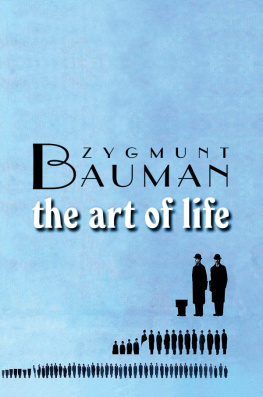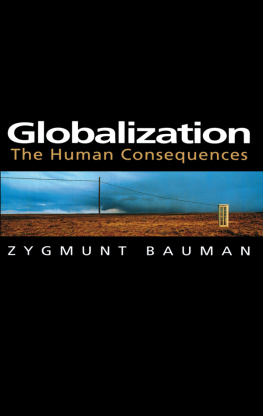Copyright Zygmunt Bauman 2001
The right of Zygmunt Bauman to be identified as author of this work has been asserted in accordance with the Copyright, Designs and Patents Act 1988.
First published in 2001 by Polity Press in association with Blackwell Publishing Ltd
Reprinted 2001, 2003, 2004, 2005, 2008
Polity Press
65 Bridge Street
Cambridge CB2 1UR, UK
Polity Press
350 Main Street
Malden, MA 02148, USA
All rights reserved. Except for the quotation of short passages for the purposes of criticism and review, no part of this publication may be reproduced, stored in a retrieval system, or transmitted, in any form or by any means, electronic, mechanical, photocopying, recording or otherwise, without the prior permission of the publisher.
Except in the United States of America, this book is sold subject to the condition that it shall not, by way of trade or otherwise, be lent, re-sold, hired out, or otherwise circulated without the publishers prior consent in any form of binding or cover other than that in which it is published and without a similar condition including this condition being imposed on the subsequent purchaser.
ISBN 978-0-7456-2506-5
ISBN 978-0-7456-2507-2 (pbk)
A catalogue record for this book is available from the British Library.
Library of Congress Cataloging-in-Publication Data
Bauman, Zygmunt.
The individualized society / Zygmunt Bauman.
p. cm.
ISBN 978-0-7456-2506-5 (alk. paper) - ISBN 978-0-7456-2507-2 (pbk)
1. Individualism. 2. PostmodernismSocial aspects. I. Title.
HM1276 .B38 2001
302.54dc21 00-024882
Typeset in 11 on 13 pt Sabon
by Kolam Information Services Pvt Ltd, Pondicherry
Printed and bound in the United States by Odyssey Press Inc., Gonic, New Hampshire
This book is printed on acid-free paper.
For further information on Polity, please visit our website : http://www.polity.co.uk
Acknowledgements
I am in debt to John Thompson, on whose initiative these papers and lectures have been collected in one volume, whose help with the selection was to me invaluable, and who also suggested the title for the collection. And I am immensely grateful to Ann Bone for the skill, dedication and patience with which she has put the result in a shape fit for publication.
Lives told and stories lived: an overture
Men are so necessarily mad Blaise Pascal quipped that not to be mad would amount to another form of madness. From madness there is no escape but another madness, Ernest Becker insists, commenting on Pascals verdict, and explains: humans are out of nature and hopelessly in it; individually and collectively, we all rise above the finitude of our bodily life and yet we know we cannot but know, though we do everything we can (and more) to forget it that the flight of life would inevitably (and literally) run into the ground. And there is no good solution to the dilemma, because it is precisely the fact of having risen above nature that opens our finitude to scrutiny and makes it visible, unforgettable and painful. We do all we can to make our natural limits a most closely guarded secret; but were we ever to succeed in that effort we would have little reason to stretch ourselves beyond and above the limits we wished to transcend. It is the sheer impossibility of forgetting our natural condition that prompts us, and allows us, to rise above it. Since we are not allowed to forget our nature, we can (and must) go on challenging it.
Everything that man does in his symbolic world is an attempt to deny and overcome his grotesque fate. He literally drives himself into a blind obliviousness with social games, psychological tricks, personal preoccupations so far removed from the reality of his situation that they are forms of madness agreed madness, shared madness, disguised and dignified madness, but madness all the same.
Agreed, shared, dignified dignified by the act of sharing and by the outspoken or tacit agreement to respect what is shared. What we call society is a huge contraption which does just that; society is another name for agreeing and sharing, but also the power which makes what has been agreed and is shared dignified. Society is that power because, like nature itself, it was here long before any of us arrived and will stay here after every one of us has long gone. Living in society agreeing, sharing and respecting what we share is the sole recipe for living happily (if not forever after). Custom, habit and routine take the poison of absurdity out of the sting of the finality of life. Society, Becker says, is a living myth of the significance of human life, a defiant creation of meaning. Mad are only the unshared meanings. Madness is no madness when shared.
All societies are factories of meanings. They are more than that, in fact: nothing less than the nurseries of meaningful life. Their service is indispensable. Aristotle observed that a solitary being outside a polis can be only an angel or a beast; no wonder, we may say, since the first is immortal and the second unaware of its mortality. Submission to society, as Durkheim points out, is a liberating experience, the very condition of liberation from blind, unthinking physical forces. Could not one say, asks Durkheim rhetorically, that it is only by a fortunate circumstance, because societies are infinitely more long-lived than individuals, that they permit us to taste satisfactions which are not merely ephemeral? The first of the quoted sentences is, as it were, pleonastic: what the submission to society offers is not so much liberation from unthinking physical forces as a liberation from thinking about them. Freedom comes in the form of exorcizing the spectre of mortality. And it is this tautology which renders the exorcism effective and makes certain types of satisfactions taste like the defeat of ruthlessly blind physical forces. When shared with those born earlier and those likely to live longer, satisfactions are not merely ephemeral; more exactly, they are cleansed (ephemerally) from the stigma of ephemerality. Inside a mortal life one can taste immortality, even if only metaphorically or metonymically by shaping ones life in the likeness of forms which are agreed to be endowed with undying value, or by coming into touch and rubbing shoulders with things which by common agreement are destined for eternity. One way or another, something of the durability of nature may rub off on the transience of the individual life.
In the same way in which knowledge of good and evil begets the potent and staunch need for moral guidance, knowledge of mortality triggers the desire for transcendence, which takes one of two forms: either the urge to force the admittedly transient life to leave traces more lasting than are those who left them, or the wish to taste this side of the edge of transient life experiences stronger than death. Society feeds on that desire in both its forms. There is an energy in that desire waiting to be channelled and directed. Society capitalizes on that energy, draws its life-juices from that desire, in so far as it manages to do just what is wanted: to supply credible objects of satisfaction, alluring and trustworthy enough to prompt efforts which make sense and give sense to life; efforts which are sufficiently energy and labour consuming to fill the time span of life, and sufficiently varied to be realistically coveted and pursued by all ranks and stations however profuse or meagre their talents and resources.
This may be, as Becker suggests, madness, but one can also argue that it may rather be a rational response to the condition which human beings cannot change, while yet they have to cope with its effects. Whatever it is, society manipulates it, much as it manipulates that other knowledge, of good and evil but its freedom of manoeuvre in this case is greater, and its responsibility more grave, since humans ate from the Tree of Good and Evil, but only heard of the Tree of Life and have no memory of tasting its fruit.

